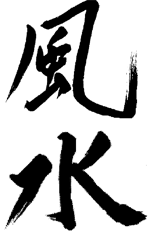|
Do Feng Shui Remedies
Really Work?
by: Steven M. Ng
THE PREMISE
Feng Shui is an
ancient Chinese art that has been
practiced for thousands of years. It is
based on the idea that there should be a
"balance" or harmony in the world.
Everything around us has its proper
place. If something is out of place and
the balance is disturbed, this
disruption can materialize as a feeling
of uneasiness in the people around it,
or as violence or lack of prosperity in
the area.
Feng Shui, in all
its various forms, acts to restore that
balance and harmony. This balance can be
in difference ways, such as health,
prosperity, wealth and love. And a lot
of it really works. The cities of Hong
Kong and Singapore are prosperous
capitals compared to their neighbors
because they are located in places where
the Feng Shui is perfect for a bustling
metropolis. Even the house of Bill
Gates, richest man in the world, is said
to be located in the perfect location in
the hills to bring its owner great
wealth.
But why does Feng
Shui not work for some people? In order
to answer that, we need to look at its
history.
THE HISTORY
Feng Shui
originated from ancient China, a land
that developed other skills and arts
such as medicine, martial arts and the
origins of chemical warfare. The
knowledge of these skills were highly
priced, and the masters of these skills
understandably did not want their
secrets to be known to others, for fear
that the knowledge could be used for
wrong purposes, or that the masters
would lose their status and prestige
once the knowledge became commonplace.
It is therefore
expected that the masters might not have
handed down all of their knowledge to
their students. These students might
have compiled whatever knowledge they
had, and guessed the remainder that they
did not learn from the masters. Some of
these students were geniuses, able to
replicate the miracles their masters had
performed. Others were not so skilled,
but used whatever knowledge they had to
make a living for themselves. This
scenario, when applied to Feng Shui,
explains the various schools of Feng
Shui that exist today. Some schools do
work wonders, but there are also those
that produce very little tangible
effect.
There are many
people who call themselves Feng Shui
masters these days, more so now with the
growth of the internet. So how do we
tell which ones can really help you?
Unfortunately, there isn't much we can
do. After all, someone can say they are
a master of a reputable school of Feng
Shui even though they are merely
charlatans. The best thing we can do is
to find someone who has had their lives
improved via Feng Shui, and get the name
of the Feng Shui practitioner who helped
them.
THE FAITH
However, another
important aspect of getting Feng Shui to
work is your belief in it. Just like the
idols of the ancient Aztecs and the
Cross of the Christians, Feng Shui
figurines and artifacts act as
"focuses". It will work if you believe
in it.
For example, in
modern pharmaceutical tests, the
researchers always say that a drug is
successful because it worked on a large
percentage (say 75%) of their test
subjects. But what about the other 25%?
If the drug really works, why didn't it
work for them? It could be that their
body's physiology was different. But in
most of the cases, the reason is
psychological. If you truly believe that
the medicine will not cure you, it
won't, no matter how good it is. "It's
all in your mind", as the psychologists
like to say.
The same goes for
Feng Shui. If you buy a Feng Shui
figurine but think it's just some voodoo
magic that probably won't work anyway, I
can assure you that it won't work for
you. You need to have faith in it. If
you believe that Feng Shui can help you
improve your life, it will. |

